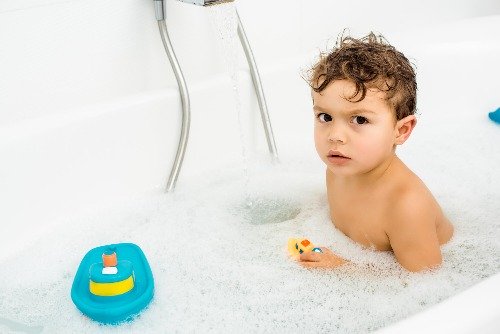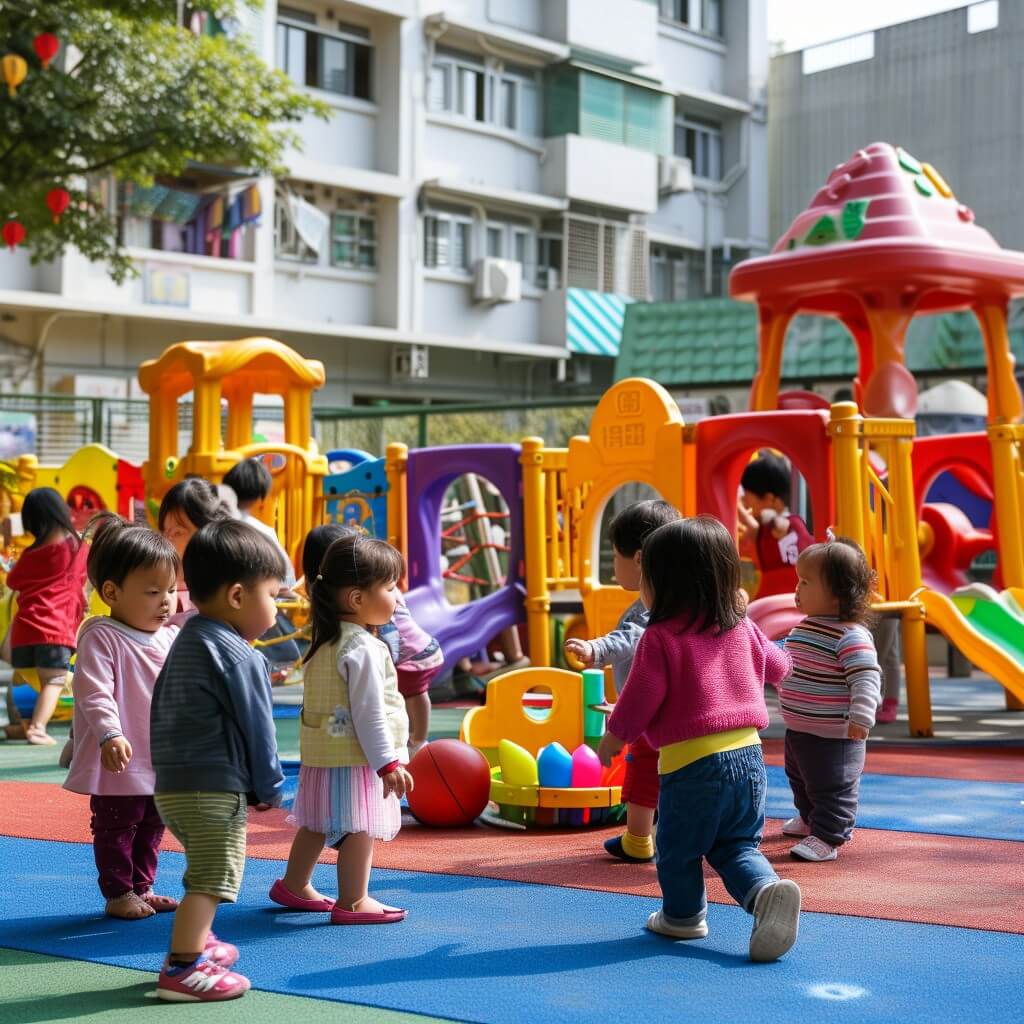Expert Advice for Parenting Toddlers
Parenting Toddlers #1 - Is Your Child a Picky Eater
Most kids are picky eaters at some time in their lives. It starts around 18 months and is usually over by six years of age. Parenting toddlers who are picky eaters will often mean they will only eat a few specific things.
Such things like eating PBJ for lunch every day and then switching to grilled cheese every day. What they're doing is looking for some sort of control and it's perfectly normal.
 A toddler is in the kitchen and is whiskingingredients in a bowl with a focused expression. depositphotos.com dmytrobandakbo
A toddler is in the kitchen and is whiskingingredients in a bowl with a focused expression. depositphotos.com dmytrobandakboThere are a few things that you can do when parenting toddlers to help them during their picky eating phase.
Keeping a mealtime routine helps
Routines such as washing hands and setting the table can help them focus on the meal rather than the TV and other electronic devices, which should be off during meal times.
Let your child help with the meal planning and preparation
Something simple like letting them tear up lettuce for a salad, also letting them choose fun items to use at meal times such as, colorful cups, fun place mats or curly straws can give them a feeling of control.
When serving, only put a small amount of food on your child's plate
Sometimes seeing three servings of three different foods can be overwhelming.
It's also important to eat with your child
Meal times are social, so talk at the table. Stay positive and talk about the color of the food, how you can hear them crunching or what they did on the playground today.
Have fun teaching your child about the joys of meal times. If you have any concerns about your child's growth and picky eating call their doctor.
Shari Karmenr
Therapeutic Services Manager & Occupational Therapist
Parenting Toddlers #2 - Promoting Their Motor Skills
As you know toddlers are always on the go. They're moving around exploring the world and this is when they develop their motor skills.
They start to use their large muscles for balancing running and jumping, and smaller muscles like the ones in their hands for grabbing things and even feeding themselves.
It's up to you to find ways to make it fun, like a good obstacle course which every child loves.
You can make one with hills, zigzags and curves, by climbing over pillows, under tables and around furniture. Then add some simple household items or their toys like little cars and stuffed animals to make it interactive.
Try building a road for them to follow using masking tape then have them drive their toy cars to the end and park each car on the dot that matches the colour of their car. Put it into a small container or sort by size.
They'll learn motor skills, thinking skills and how to follow directions. There are all sorts of things you can do.
If your toddler likes balls or pushing boxes around the house, have them throw balls into a laundry basket and then push it around. This builds strength and coordination.
Sensory bins are also fun and easy to put together.
A box full of sand, uncooked pasta or beans, some cups, spoons and ladles are all interesting items to your toddler and helps them develop tool use.
Whatever the activity, just enjoy hours of fun playing with your toddler and helping them develop their motor skills.
Shari Karmenr
Therapeutic Services Manager & Occupational Therapist
Parenting Toddlers #3 - Getting Attention in a Respectful Way
Children have lots to say and want your attention and that's wonderful, but how can you teach your preschooler to get attention in a respectful way?
 Very young boy is sitting on the carpeted floor while playing with a laptop computer. depositphotos.com
vitalikradko
Very young boy is sitting on the carpeted floor while playing with a laptop computer. depositphotos.com
vitalikradkoFirst, decide what's respectful in your family. Children learn what they see you doing, so model for them.
Get their attention respectfully in the way you would like them to do it.
Let them see you doing the same with others. We often teach children in preschool to tap a teacher or a friend on the shoulder. If you're expecting your child to wait, it's not easy for them.
Let them know when you can give them your attention, make it concrete for younger children. In a minute, is not clear and can seem like forever for your child who doesn't have a concept of time.
Try giving them a choice of something to do while they wait, like you can draw or play Legos and when I'm done, I will listen.
And that last part is so important. Your child will learn to trust that you will follow through. So getting your attention respectfully will get easier over time.
Amy Thrasher
Speech Therapist
Parenting Toddlers #4 - Helping Your Child Cope With Anxiety
Anxiety is a normal part of your child's growing experience and all kids experience it. To help them deal with it here are a few tips:
Just like you, your child needs a healthy diet. Avoiding foods with artificial coloring or preservatives can help.
Pick snacks that have less sugar in them, supplements like multivitamins can help especially when your child is a picky eater.
What also helps with anxiety is to get your kids moving, any activities that are aerobic and involve cardio will do the trick. It’s even better when you can do it as a family or they can do it with their friends.
Once they're done moving and eating some good food that's when they'll get some good sleep.
Uninterrupted deep sleep is so important to your child's mental health.
This last tip is probably something we can all do better at; which is limiting screen time as much as possible.
This will help your child develop good habits in spending time with you and others and not be so focused on the virtual world.
These are just a few tips to help with anxiety, but if these aren't enough and your child continues to struggle with anxiety and excessive worry. Talk it over with their pediatrician and together you can figure out what's next.
Jenna Whitham, MD
Pediatrician
Parenting toddlers #5 - Bedtime Routines and Your Child
A predictable calming bedtime routine gives your child a sense of security as they go from being awake to sleeping. It's a beautiful time for connection which helps your child feel loved and secure.
Children actually need 10 to 12 hours of sleep spread across nighttime and naps if they take them. So having your child sleep and wake at nearly the same time each day, is important.
To make the nighttime as restful as possible, make sure your child gets plenty of physical activity during the day. If they can't go outside some days, you could set up an indoor obstacle course or have a dance party.
 Toddler having a bubble bath with his ship and ducky. depositphotos.com
igirvetushko
Toddler having a bubble bath with his ship and ducky. depositphotos.com
igirvetushkoStart your child's bedtime routine after dinner, keep the steps of their bedtime routine the same each night.
For example, first brush teeth, then choose a book, say good night, then sleep.
Darken the room with softer lights and lower the shades. Some children sleep better with calming music or white noise
or a dim night light.
Also no screens during their nighttime routine. Your child may do better with some choice in their bedtime routine. They can choose their jammies, get their special blanket or stuffed animal.
Let them pick two books they want to read before bedtime. Reading can help them into a dreamy state and your soothing voice is what your child loves to hear.
Finally give your child a special good night kiss or hug and leave the room. Learning to fall asleep on their own is an essential skill for children and will make their bedtime routine that much smoother for the years to come.
Good night and pleasant dreams.
Amy Thrasher
Speech Therapist
In conclusion, parenting a toddler is wonderful, it just requires a lot of patience, being consistent and all the love you can give.
By setting clear expectations and providing open communication you can get through this with confidence.
So celebrate their milestones and cherish the precious moments of parenting a toddler.






















New! Comments
Have your say about what you just read! Leave me a comment in the box below.